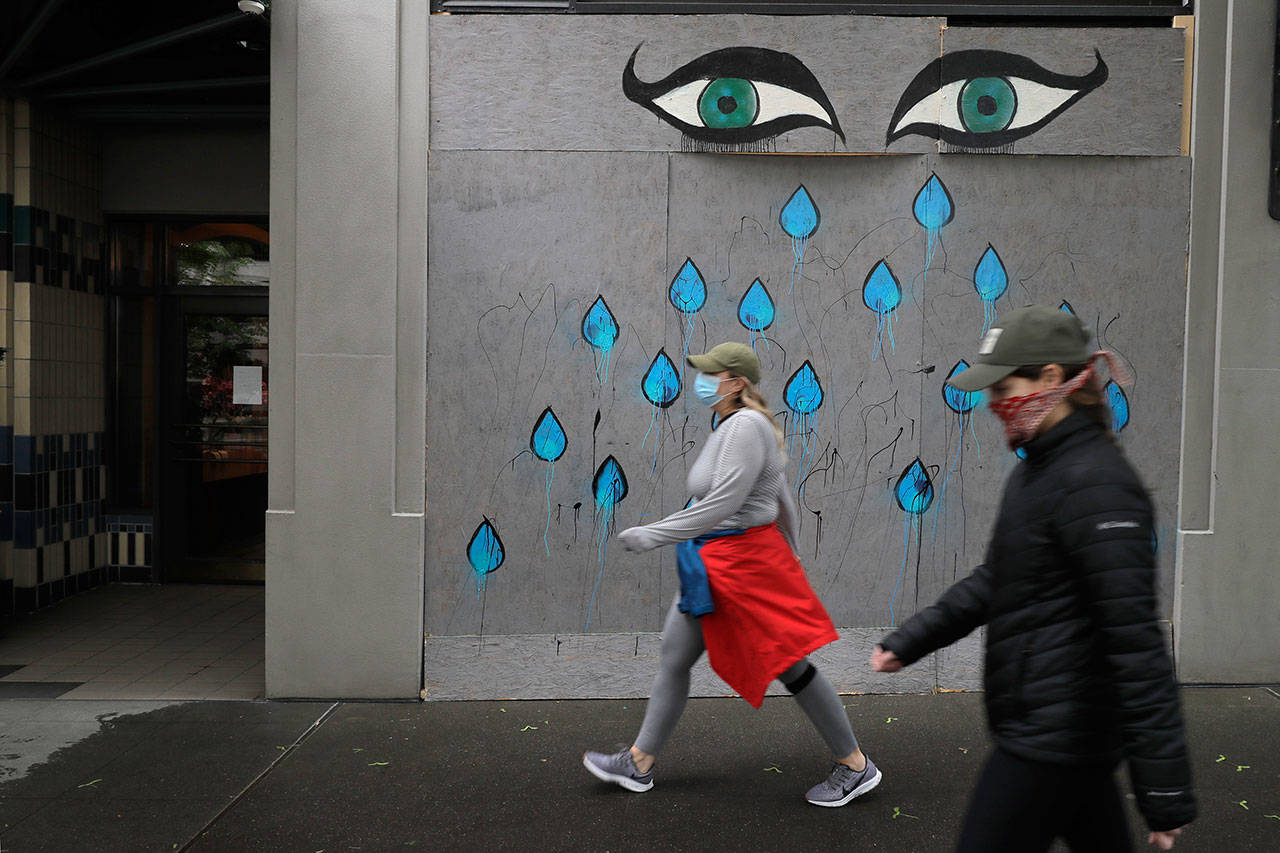By The Herald Editorial Board
As the Memorial Day weekend continues — with a good chance according to weather forecasts that at least it won’t rain — many of us will be headed out for long-awaited excursions outdoors: picnics at state parks, relaxing at beaches, hitting the trails; even the pickleball courts are open in Everett.
So, pack the sunscreen. And, yes, a face mask.
The sunscreen you can do for your own health. The face mask is out of concern for others.
Now two months into a stay-home orders adopted to limit the spread of the coronavirus pandemic, Washington state is rousing itself slowly from an economic hibernation that is being lifted in phases, with some counties emerging before others. Island County, for example, is among 10 counties that can now apply to join others approved for the second phase of the state’s economic reopening plan. Snohomish County, among counties where the disease has been most prevalent, will likely take a slower path to fully opening.
Yet, key to that path will be continued efforts to limit the virus’ opportunities to infect new victims and continue its spread as we venture out of our homes more frequently and increase our contact with others.
As with other recommendations that were made part of Gov. Jay Inslee’s “Stay Home, Stay Healthy” orders — specifically business closures and other limitations — there’s been vocal pushback against the recommendations to wear masks and the decisions by some businesses, such as Costco, to require customers to wear masks when shopping.
We get it: The masks can be cumbersome. And hot. And can steam up eyeglasses.
But there are clear indications that they can limit the spread of disease, help save lives, and, thus, allow a quicker reopening of local and state economies.
Medical studies on the effectiveness of masks aren’t definitive. But a report from a United Kingdom study by Data Evaluation and Learning for Viral Epidemics concluded that face masks — including homemade cloth masks — can contribute to reducing viral transmission. While it only had a small number of studies from which to review, the study found that face masks, while less effective in protecting the wearer, can limit spread to others if worn by those who carry the virus but have yet to show symptoms of COVID-19.
And those infected might not always know. The studies note that it can take between five and 14 days for someone infected by the virus to show symptoms; the wait for test results can add more time until a diagnosis is confirmed.
“The authors flag the important finding that much if not most transmission of Sars-CoV-2 [coronavirus] happens from people who do not currently have symptoms,” Trisha Greenhalgh, an Oxford professor, told The Guardian.
A recent article in The Atlantic, for which Greenhalgh is a co-author, discusses modeling that shows that if 80 percent of people wear masks that are 60 percent effective in blocking the droplets that carry coronavirus — which cloth masks can provide — the result is an infection rate low enough to halt the disease’s spread.
“The community use of masks for source control is a ‘public good’: something we all contribute to that eventually benefits everyone — but only if almost everyone contributes, which can be a challenge to persuade people to do,” Greenhalgh and the authors write.
Because of the possibility for transmission by those who are infected but aren’t showing symptoms, masks should be worn especially while shopping, out of respect and concern for the health of other shoppers and store employees. Customers might spend up to an hour or so in the store and pass by scores of other shoppers; employees, however, come in contact with hundreds of customers over the course of an eight-hour shift.
Costco’s policy should be adopted by other retail stores, especially as some store chains have announced that they’re replacing a $2-an-hour “hazard pay” benefit with a one-time “thank you” bonus. If stores aren’t paying “hazard pay,” they should require the masks and make the job less hazardous.
Some of the debate over the necessity of masks goes back to seemingly contradictory advice, much of it relayed by the news media early on from medical experts, including the federal Centers for Disease Control and Prevention. Prior to April, the CDC was advising against the use of masks for those who were not showing symptoms — in particular, surgical masks and N95 respirators — because those supplies were short and medical workers and first responders needed them.
That guidance from the CDC, however, changed in early April, reports Politifact. Since then, the CDC has recommended that, except for children younger than 2 years of age and those who have trouble breathing, people should “wear a cloth face covering to cover their nose and mouth in the community setting,” in stores and especially in public in areas of widespread COVID-19 illness.
Face masks don’t provide total protection against coronavirus. But used together with other social-distancing practices — frequent handwashing, use of hand sanitizer, keeping at least 6 feet apart from others who aren’t part of your household, avoiding crowds and limiting travel — it all adds up to provide protection and decrease the odds of exposure.
“You layer all those imperfect things together and it gives you a really tightly woven net for protecting the safety of the public,” Dr. Jared Baeten, vice dean of the University of Washington’s School of Public Health, told The Seattle Times.
Along with the sunscreen, trust us on the face masks.
Talk to us
> Give us your news tips.
> Send us a letter to the editor.
> More Herald contact information.

























